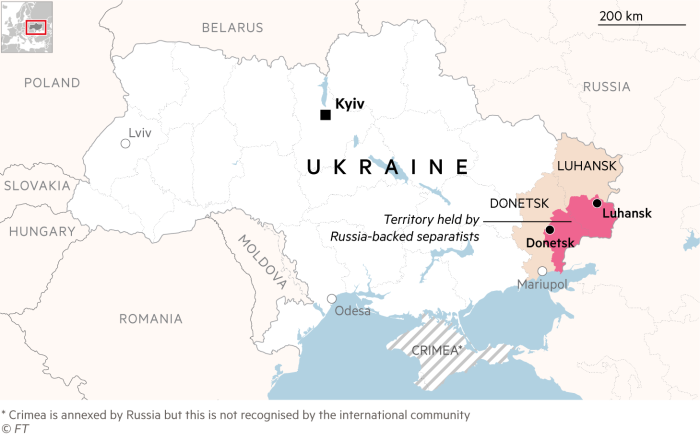Russia’s president Vladimir Putin has ordered troops into eastern Ukraine after recognising two Moscow-backed separatist regions, hobbling the prospects of a diplomatic solution to the crisis as he put his country on a war footing.
Putin directed his military to enter rebel-held regions in Ukraine’s Donbas border area for “peacekeeping” operations after signing decrees pronouncing their independence on Monday.
The decrees and military order sparked international condemnation as the US and European allies vowed to respond with sanctions.
Antony Blinken, US secretary of state, said Putin’s decision to recognise the Russian-backed Donetsk and Luhansk people’s republics as independent was a “clear attack” on Ukraine’s sovereignty.
“States have an obligation not to recognise a new ‘state’ created through the threat or use of force,” Blinken said, adding that it was “yet another example of President Putin’s flagrant disrespect for international law and norms”.
Blinken said that state department staff in the western city of Lviv would spend the night in Poland for “security reasons”.
Putin announced the moves following an angry televised speech in which he cast doubt on Ukraine’s statehood and accused the west of using the country as a tool to destroy Russia. He also made clear that his grievances with Kyiv stretched to the country’s existence in its current form.
The separatist Donetsk and Luhansk people’s republics were recognised at a signing ceremony in the Kremlin after Putin warned that Russia would hold Ukraine responsible for any “ensuing bloodshed” in the region.

A senior US official on Monday said Putin’s speech was part of an effort to justify an invasion of Ukraine that could come as early as in the “coming hours”.
“It was an attack on the very idea of a sovereign and independent Ukraine,” the US official said. “He made a number of false claims about Ukraine’s intentions that seemed designed to excuse possible military action. This was a speech to the Russian people to justify a war.”
The Russian troops look set to remain in the Donbas region indefinitely, according to draft agreements published by the Kremlin under which Russia would defend the separatist states’ borders. Moscow deployed troops to the Donbas in 2014-2015, but has hitherto denied, despite overwhelming evidence to the contrary, that it was a party to the conflict there.
Western powers worried that the troops could help create a pretext for Russia to attack Ukrainian forces. Putin repeated unsupported claims that Ukraine has stepped up an artillery and “terrorist” campaign against the separatists, which Kyiv and its western allies said was laying the groundwork for a “false flag” operation.
Following Putin’s decision to recognise the areas as independent, Joe Biden issued an executive order banning new investment, trade and financing by US entities in the Donetsk and Luhansk regions.
The White House said it would unveil additional measures to respond to the “blatant violation of Russia’s international commitments”. The US official said the Biden administration was watching the movement of the Russian troops and would respond accordingly, without providing any specifics.
Olaf Scholz’s spokesperson said Germany’s chancellor “condemned” the recognition of Donetsk and Luhansk as independent states, adding that the move was “completely at odds with the Minsk agreement on a peaceful solution of the conflict in eastern Ukraine”.
Putin’s decision sparked an intense round of diplomacy involving Biden, Scholz and Emmanuel Macron, president of France.
“This step will not go unanswered,” said Scholz’s spokesperson.
A French official said “proportional, targeted sanctions” would be discussed in Brussels: “Russia must pay the price of its decisions this evening. All this has a cost and we want to proportion this cost to the decisions taken by President Putin.”
The UK will announce sanctions against Russia on Tuesday, Liz Truss, foreign secretary, announced, in immediate reprisals against Moscow’s “breach of international law and attack on Ukraine’s sovereignty and territorial integrity”.
Putin’s speech followed a meeting with his national security council where Russian officials lined up to denounce Ukraine and the US, disparage the stalled Minsk peace process and urge Putin to recognise the separatists.
“No one should mistake the theatrics as legitimate statecraft,” said the US official. “This is Potemkin politics. President Putin accelerating the very conflict that he is creating.”
Earlier, Moscow claimed it had destroyed two Ukrainian military vehicles that strayed into its territory, killing five. The unconfirmed incident would be the first direct clash with Ukraine’s forces since Moscow mobilised 190,000 troops on its border.
Daily reports of clashes in eastern Ukraine have been an ominous backdrop to diplomatic efforts to defuse the crisis.
Putin and Biden have accepted in principle the idea of holding a summit to ease tensions but the Kremlin has played down expectations that it would go ahead. The US official said the White House had made clear a meeting could only proceed if Russia did not take more military action in Ukraine.
Additional reporting by Guy Chazan in Berlin and Derek Brower in New York

